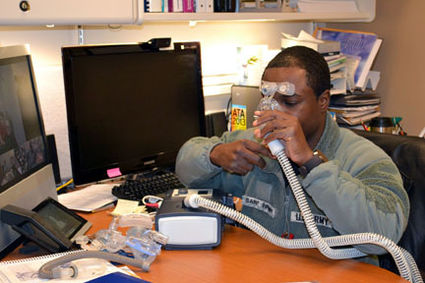Telesleep at Houston VA: A new source of support for veterans
Last updated 3/27/2013 at Noon
The Michael E. DeBakey VA Medical Center (MEDVAMC) is providing care to Veterans with sleep related breathing disorders in its rural areas with telemedicine technologies.
Telesleep provides Veterans at the MEDVAMC community outpatient clinics in Lufkin, Beaumont, Conroe, Richmond, Lake Jackson, Galveston and Texas City with faster diagnosis and treatment options for sleep related breathing disorders such as obstructive sleep apnea.
Obstructive sleep apnea (OSA) is one of the most common types of sleep disorders. It occurs when the upper airway becomes narrow as the upper airway muscles relax naturally during sleep. In OSA, breathing stops or becomes very shallow. This type of event may happen hundreds of times each and every night. This reduces oxygen in the blood and causes arousal from sleep. The low oxygen is the main reason for other medical problems such as heart diseases.
A major symptom is extremely loud snoring, sometimes so loud that bed partners find it intolerable. Other indications that sleep apnea may be present are obesity, persistent daytime sleepiness, bouts of awakening out of breath during the night, and frequently waking in the morning with a dry mouth or a headache. A patient with OSA usually wakes up feeling un-refreshed and tired. Only a sleep study in a sleep laboratory or home sleep testing can show definitively that sleep apnea is present and determine its severity.
Veterans who are identified by their primary care physicians as candidates for a sleep study are scheduled for a group diagnostic session at their respective clinic. The session is conducted through video conferencing with a sleep physician and a health technician at MEDVAMC. Each Veteran is assigned a home sleep testing kit and trained on how to properly use it for a period of sleep of at least 4-6 hours. The device is returned to the health care provider as soon as possible, and the data is extracted from the device and sent to the sleep physician for evaluation and diagnosis.
Upon diagnosis of OSA, if the patient’s OSA is not complicated by other illnesses, the Veteran returns to the clinic to receive their Positive Airway Pressure (PAP) machine. PAP is administered at night during sleep through a nasal or facial mask held in place by Velcro straps around the patient’s head. The mask is connected by a tube to a small fan-generated air flow machine about the size of a shoe box. The PAP machine increases air pressure in the throat so that the airway does not collapse when one breathes in. The air pressure is adjusted as needed after evaluation by the sleep physician.
“Untreated, OSA is associated with high blood pressure, heart failure and other cardiovascular diseases, stroke, memory problems, weight gain, impotence, and headaches. Fortunately, sleep apnea can be diagnosed and treated,” said Amir Sharafkhaneh, M.D., Ph.D., medical director of the MEDVAMC Sleep Disorder Center.
“Telesleep allows the Veterans the ability to be evaluated in the comfort of their own home in a more timely and efficient manner. Being able to provide this service in the community clinics is just another example of taking the care to where the Veteran lives,” said Sharafkhaneh.”
Respiratory Therapist, St. Hilaire Saint Firmin, RRT, demonstrates the proper fitting for the Positive Airway Pressure (PAP) machine to Veterans at the outpatient clinics.













Reader Comments(0)